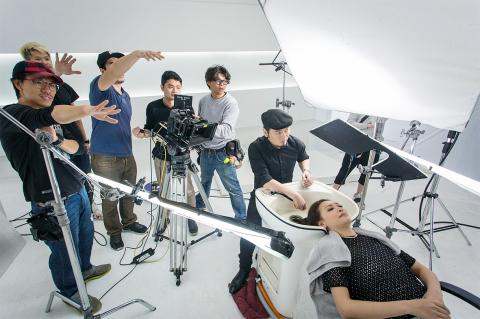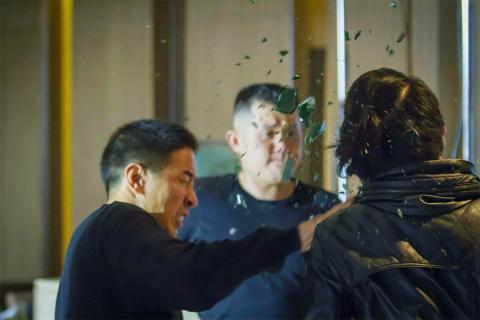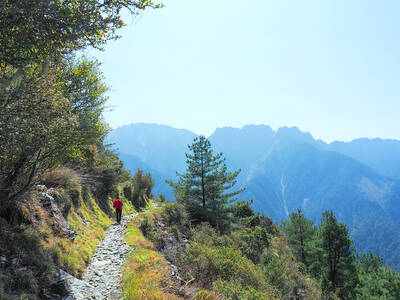Like other entrepreneurial-minded expats in Taiwan, Michael Geier has created a niche for himself in the filmmaking industry. His secret? Wearing many hats. Sometimes he’s a set photographer for his friends’ music videos. Sometimes he’s a line producer for indie feature productions and other times, he’s collaborating with high-profile, multinational companies to make snazzy-looking corporate videos.
Geier, who is originally from Austria, co-founded the production and design house Aduzai Co Ltd to pull all these roles together — his company does everything from promotional videos and animations to photo shoots.
After years of filmmaking experience in Taiwan, Geier says one major difference with working in Austria or Germany was that “smaller budgets work on very efficient team work where people have skills in several jobs rather than being specialized in just one ... Here, it is a bit more about going with the flow.”

Photo Courtesy of Michael Geier
Geier will be sharing his experiences being an expat filmmaker in Taiwan along with insightful tips for those aspiring to break into the industry here at the monthly Filmmakers Night organized by filmmaker Tobie Openshaw at New Taipei City’s Yang San-lang Art Museum on Sunday.
CAPTURING MOVEMENT, PROMOTING COLLABORATION
Geier is a particularly talented set photographer. From shooting behind-the-scenes photos for hair product advertisements to capturing shots from music videos about dancing drag queens, he manages to capture movement in still shots. His pictures draw you in and make you want to know more about the story behind it.

Photo Courtesy of Michael
One of his most beautiful photo series is on the set for the Black White Wall (黑色的白牆) music video directed by Chinese-American filmmaker James Feng (馮錚). The essence of the music video, which tackles the problem of bullying and homelessness in Taipei, is dramatically captured in Geier’s pictures. The fight scenes are especially powerful — shards of broken glass hang suspended in mid-air.
This production in particular was an interesting collaboration between filmmakers, photographers and actors from different cultural and linguistic backgrounds.
Geier says the collaboration between expat and local filmmakers is “definitely growing and improving.”

Photo Courtesy of Michael
“Taiwan has a lot to show and offer – it’s often times even surprising for locals, so showing that and amaze and inspire people about their own country is something very special,” he adds.
As per if Taiwan will ever become internationally recognized as a filmmaking hub, whether for shooting simple commercials or feature length films, Geier says that it’s certainly trying very hard. The government has been providing many incentives such as funds for location shootings – “and having somebody like Ang Lee as an icon helps,” he adds.
The difference, Geier says is that “international clients have very strong brand awareness…these companies are always trying to be more innovative and progressive, having the latest look compared to often a bit more conservative approach here.”

June 9 to June 15 A photo of two men riding trendy high-wheel Penny-Farthing bicycles past a Qing Dynasty gate aptly captures the essence of Taipei in 1897 — a newly colonized city on the cusp of great change. The Japanese began making significant modifications to the cityscape in 1899, tearing down Qing-era structures, widening boulevards and installing Western-style infrastructure and buildings. The photographer, Minosuke Imamura, only spent a year in Taiwan as a cartographer for the governor-general’s office, but he left behind a treasure trove of 130 images showing life at the onset of Japanese rule, spanning July 1897 to

In an interview posted online by United Daily News (UDN) on May 26, current Chinese Nationalist Party (KMT) Chairman Eric Chu (朱立倫) was asked about Taichung Mayor Lu Shiow-yen (盧秀燕) replacing him as party chair. Though not yet officially running, by the customs of Taiwan politics, Lu has been signalling she is both running for party chair and to be the party’s 2028 presidential candidate. She told an international media outlet that she was considering a run. She also gave a speech in Keelung on national priorities and foreign affairs. For details, see the May 23 edition of this column,

At Computex 2025, Nvidia CEO Jensen Huang (黃仁勳) urged the government to subsidize AI. “All schools in Taiwan must integrate AI into their curricula,” he declared. A few months earlier, he said, “If I were a student today, I’d immediately start using tools like ChatGPT, Gemini Pro and Grok to learn, write and accelerate my thinking.” Huang sees the AI-bullet train leaving the station. And as one of its drivers, he’s worried about youth not getting on board — bad for their careers, and bad for his workforce. As a semiconductor supply-chain powerhouse and AI hub wannabe, Taiwan is seeing

Jade Mountain (玉山) — Taiwan’s highest peak — is the ultimate goal for those attempting a through-hike of the Mountains to Sea National Greenway (山海圳國家綠道), and that’s precisely where we’re headed in this final installment of a quartet of articles covering the Greenway. Picking up the trail at the Tsou tribal villages of Dabang and Tefuye, it’s worth stocking up on provisions before setting off, since — aside from the scant offerings available on the mountain’s Dongpu Lodge (東埔山莊) and Paiyun Lodge’s (排雲山莊) meal service — there’s nowhere to get food from here on out. TEFUYE HISTORIC TRAIL The journey recommences with